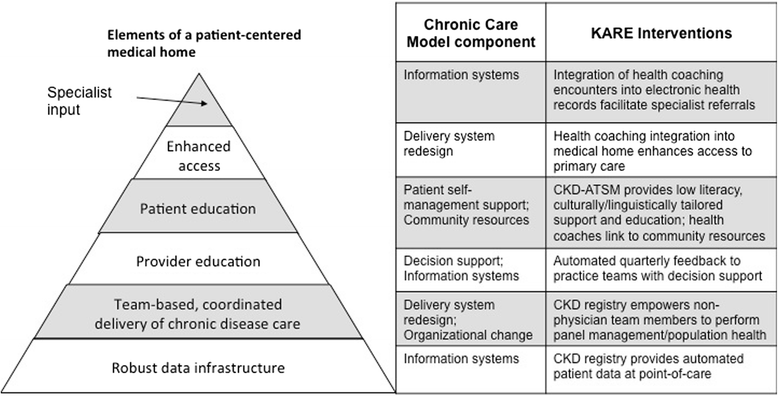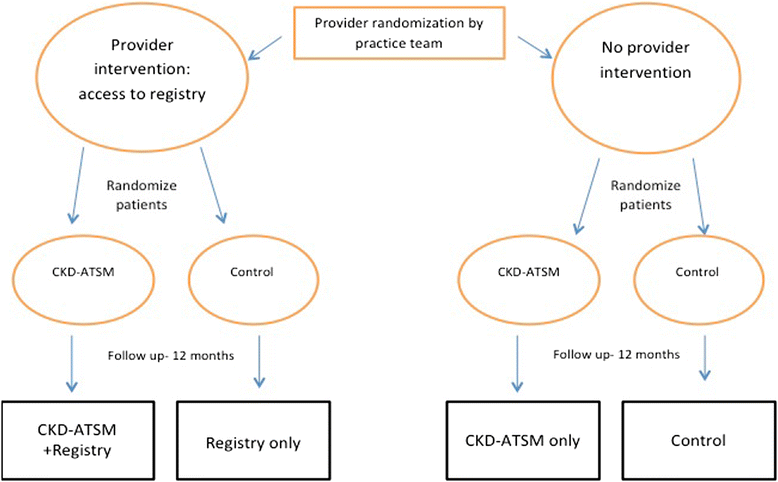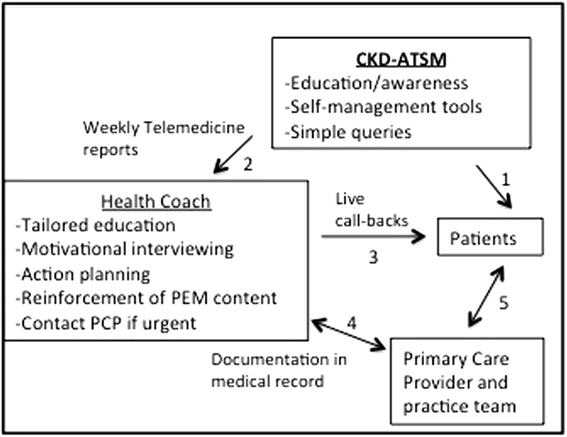The Kidney Awareness Registry and Education (KARE) study: protocol of a randomized controlled trial to enhance provider and patient engagement with chronic kidney disease
- PMID: 26494562
- PMCID: PMC4618520
- DOI: 10.1186/s12882-015-0168-4
The Kidney Awareness Registry and Education (KARE) study: protocol of a randomized controlled trial to enhance provider and patient engagement with chronic kidney disease
Abstract
Background: Chronic kidney disease (CKD) is common and is associated with excess mortality and morbidity. Better management could slow progression of disease, prevent metabolic complications, and reduce cardiovascular outcomes. Low patient awareness of CKD and ineffective patient-provider communication can impede such efforts. We developed provider and patient-directed interventions that harness health information technology to enhance provider recognition of CKD and delivery of guideline concordant care and augment patient understanding and engagement in CKD care.
Methods/design: We report the design and protocol of the Kidney Awareness Registry and Education (KARE) Study, a 2x2 factorial randomized controlled trial that examines the impact of a multi-level intervention on health outcomes among low-income English, Spanish and Cantonese-speaking patients with CKD in a safety net system. The intervention includes: (1) implementation of a primary care electronic CKD registry that notifies practice teams of patients' CKD status and employs a patient profile and quarterly feedback to encourage provision of guideline-concordant care at point-of-care and via outreach; and (2) a language-concordant, culturally-sensitive self-management support program that consists of automated telephone modules, provision of low-literacy written patient-educational materials and telephone health coaching. The primary outcomes of the trial are changes in systolic blood pressure (BP) and the proportion of patients with BP control (≤ 140/90 mmHg) after one year. Secondary outcomes include patient understanding of CKD, participation in healthy behaviors, and practice team delivery of guideline-concordant CKD care.
Discussion: Results from the KARE study will provide data on the feasibility, effectiveness, and acceptability of technology-based interventions that support primary care efforts at improving health outcomes among vulnerable patients with CKD.
Trial registration: ClinicalTrials.gov, number: NCT01530958.
Figures
Similar articles
-
Engagement With a Health Information Technology-Augmented Self-Management Support Program in a Population With Limited English Proficiency: Observational Study.JMIR Mhealth Uhealth. 2021 May 11;9(5):e24520. doi: 10.2196/24520. JMIR Mhealth Uhealth. 2021. PMID: 33973868 Free PMC article.
-
Acceptability of a multilevel intervention to improve blood pressure control among patients with chronic kidney disease in a public health care delivery system.Clin Kidney J. 2018 Aug;11(4):540-548. doi: 10.1093/ckj/sfx141. Epub 2017 Dec 20. Clin Kidney J. 2018. PMID: 30094019 Free PMC article.
-
Interventions to Improve Blood Pressure Control Among Socioeconomically Disadvantaged Patients With CKD: Kidney Awareness Registry and Education Pilot Randomized Controlled Trial.Kidney Med. 2019 Aug 30;1(5):242-252. doi: 10.1016/j.xkme.2019.07.004. eCollection 2019 Sep-Oct. Kidney Med. 2019. PMID: 32734204 Free PMC article.
-
Improving Blood Pressure Management in Primary Care Patients with Chronic Kidney Disease: a Systematic Review of Interventions and Implementation Strategies.J Gen Intern Med. 2020 Nov;35(Suppl 2):849-869. doi: 10.1007/s11606-020-06103-7. Epub 2020 Oct 26. J Gen Intern Med. 2020. PMID: 33107008 Free PMC article.
-
Telehealth Applications to Enhance CKD Knowledge and Awareness Among Patients and Providers.Adv Chronic Kidney Dis. 2017 Jan;24(1):39-45. doi: 10.1053/j.ackd.2016.11.017. Adv Chronic Kidney Dis. 2017. PMID: 28224941 Free PMC article. Review.
Cited by
-
Amplifying the Patient Voice: Key Priorities and Opportunities for Improved Transplant and Living Donor Advocacy and Outcomes During COVID-19 and Beyond.Curr Transplant Rep. 2020;7(4):301-310. doi: 10.1007/s40472-020-00295-x. Epub 2020 Sep 1. Curr Transplant Rep. 2020. PMID: 32904875 Free PMC article. Review.
-
The COVID-19 Pandemic Converges With Kidney Policy Transformation: Implications for CKD Population Health.Am J Kidney Dis. 2021 Feb;77(2):268-271. doi: 10.1053/j.ajkd.2020.10.004. Epub 2020 Nov 7. Am J Kidney Dis. 2021. PMID: 33171214 Free PMC article. No abstract available.
-
Interventions for improving health literacy in people with chronic kidney disease.Cochrane Database Syst Rev. 2022 Dec 6;12(12):CD012026. doi: 10.1002/14651858.CD012026.pub2. Cochrane Database Syst Rev. 2022. PMID: 36472416 Free PMC article.
-
Role of telehealth in renal replacement therapy education.Semin Dial. 2018 Mar;31(2):129-134. doi: 10.1111/sdi.12663. Epub 2018 Jan 3. Semin Dial. 2018. PMID: 29314304 Free PMC article. Review.
-
eHealth interventions for people with chronic kidney disease.Cochrane Database Syst Rev. 2019 Aug 6;8(8):CD012379. doi: 10.1002/14651858.CD012379.pub2. Cochrane Database Syst Rev. 2019. PMID: 31425608 Free PMC article.
References
-
- Tarver-Carr ME, Powe NR, Eberhardt MS, LaVeist TA, Kington RS, Coresh J, et al. Excess risk of chronic kidney disease among African-American versus white subjects in the United States: a population-based study of potential explanatory factors. J Am Soc Nephrol. 2002;13(9):2363–70. doi: 10.1097/01.ASN.0000026493.18542.6A. - DOI - PubMed
Publication types
MeSH terms
Associated data
Grants and funding
LinkOut - more resources
Full Text Sources
Other Literature Sources
Medical




